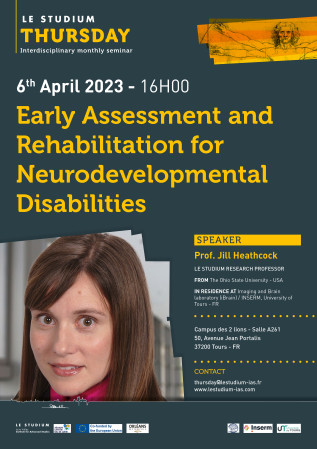Early Assessment and Rehabilitation for Neurodevelopmental Disabilities
Campus des 2 lions - Salle A261
50, Avenue Jean Portalis
37200 Tours
France
Presentation
Risk factors for poor neurodevelopmental outcomes include maternal factors and infant factors. Obesity (maternal) during pregnancy and preterm birth (infant) are public health concerns because there are adverse consequences for the mother and the infant. The most promising target to improve outcomes for the child is through early identification of disability with appropriate assessment tools and then focused rehabilitation. One of the most challenging issues in health and medicine is the accurate identification of disability during the infancy period -- before babies are able to walk and talk. Recent advances in clinical measures, video, and 3D motion capture technology can objectively measure of spontaneous and purposeful movements used to detect poor neurodevelopment. Using a stakeholder approach, assessment that focus on very early movements of the arms, legs, and body can identify factors for poor neurodevelopment much earlier than is currently possible. Rehabilitation treatments that are parent-centered, goal-directed, high repetition, include operant conditioning, and self-generated infant movements are the most efficacious.
Speaker
LE STUDIUM Research Professor
FROM: The Ohio State University - USA
IN RESIDENCE AT: Imaging and Brain laboratory (iBrain) / INSERM, University of Tours - FR







